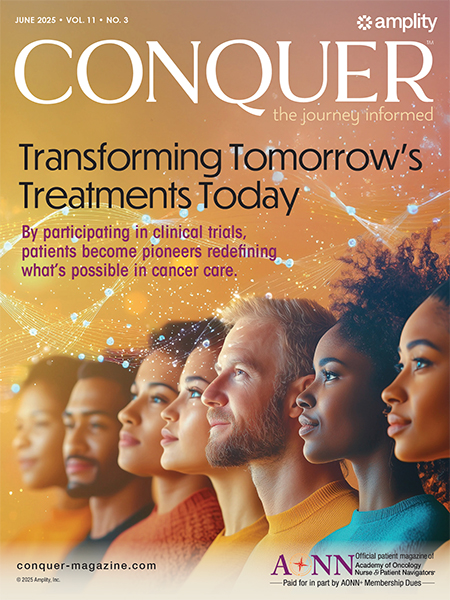Navigation & Survivorship News
Getting Resources to the Navigators
It has been a productive 2023 for AONN+’s active Local Navigation Networks (LNNs). Through these gatherings, members benefit from the sharing of resources—whether they are local, statewide, or supported by the pharmaceutical industry.
Influenced Decision-Making: The Considerations Patients Weigh Amidst Selecting Treatment
The decisions our patients make about their treatment are deeply personal. They might select one treatment plan over another based on how they process information, their experiences with cancer, and their life goals. Lillie shares a few recent examples of the decisions her patients have made that are both in line with and against their treatment team’s suggestion.
The Academy of Oncology Nurse & Patient Navigators (AONN+) Applauds the Centers for Medicare & Medicaid Services for Including Reimbursement for Oncology Patient Navigation in CY24 Medicare Physician Fee Schedule Proposal
In recognition of the recent announcement by the Centers for Medicare & Medicaid Services (CMS) proposing payment for community health integration services, the Academy of Oncology Nurse & Patient Navigators (AONN+) sees this opportunity as a key initiative to strengthen and accelerate the oncology navigation footprint in every community.
Melanoma—The Life-Threatening Skin Cancer
Summer is here! With warm weather comes an increase in outdoor activities. Because we know that more than 90% of skin cancers are caused by sun exposure, we need to be mindful of wearing sunblock and encourage our patients to do the same. Read on for points to bring up with your patients.
Welcome to the Adapting and New Local Navigation Networks in 2023
As the navigation profession grows in numbers and value, so do our Local Navigation Networks (LNNs). In this month’s Member’s Memo, AONN+ Program Director Sharon Gentry shares how 2 of our LNNs have adapted to better accommodate members’ needs and announces the launch of 3 new LNNs!
Go It Alone
The phrase “go it alone” is often used when someone decides to do something by themselves, without help from others. Sharon sees a different spin on this phrase and, in this month’s Members Memo, discusses how it can also be an ode to the independence and resilience of our Local Navigation Networks.
Mental Health and Cancer
Navigators caring for cancer patients know that cancer doesn’t just affect patients’ bodies, but also their minds. Navigators can only help ensure patients receive the support they need if they know their patients are struggling. In this month’s Insights into Navigation, Lillie provides some tips on how to determine the mental health status, potential needs, and supports for both patients and their caregivers.
The History of the “+” in the AONN+ Logo
In 2013, nurses made up the majority of AONN membership, but many patient navigators without clinical licensure were also joining. This realization, paired with several timely initiatives, spurred AONN to change its name to the Academy of Oncology Nurse & Patient Navigators, Inc.® (AONN+) later that year.
Helping Your Patients Proactively Plan for Their Cancer Screenings
We all know that screening tests can detect some cancers early (when treatment works best), but do our patients know that? We can help educate our patients on the importance of early cancer detection and where they should inquire for screenings related to women’s health, head and neck cancer, skin cancer, colorectal cancer, and prostate cancer.
Local Navigation Networks (LNNs): Welcoming Newly Formed Networks and Reporting Best Practices from Existing Ones
LNNs have been consistently growing since their inception in 2013. In 2023, there are 35 national, international, and virtual LNN groups. Sharon’s latest Members’ Memo welcomes the 6 newly formed LNNs (5 new, 1 consolidation) and shares tips, tricks, and best practices for maximizing engagement as reported from existing LNN leaders.
Thank You to Our Corporate Sponsors and Alliance Partners!

Major Corporate Sponsor

Patron Corporate Sponsor

Patron Corporate Sponsor

Patron Corporate Sponsor

Industry Relations
Council Member

Industry Relations
Council Member

Industry Relations
Council Member

National Alliance Partner

National Alliance Partner

National Alliance Partner

National Alliance Partner

National Alliance Partner

National Alliance Partner
Privacy Notice | Terms of Use
© 2009- DBA AONN+ Academy of Oncology Nurse & Patient Navigators® | PO Box 357387, Gainesville, FL 32635-7387 |
AONN+ DBA AONN+ is a 501(c)(6) organization under federal tax guidelines. AONN+ Foundation for Learning, Inc. a 501(c)(3) organization under federal tax guidelines.
AONN+ Advantage, LLC, a wholly owned subsidiary of AONN+.


